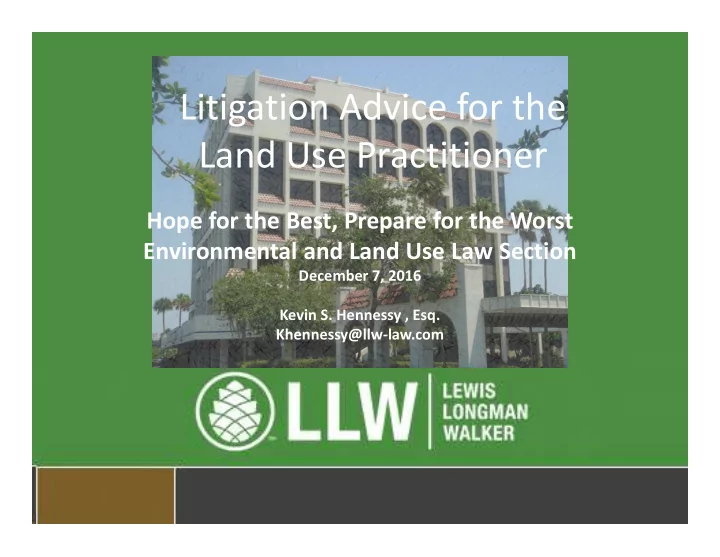

Litigation Advice for the Land Use Practitioner Hope for the Best, Prepare for the Worst Environmental and Land Use Law Section December 7, 2016 Kevin S. Hennessy , Esq. Khennessy@llw-law.com
What am I seeking? – Comprehensive plan adoption and amendment – Zoning ordinance adoption and amendment – Rezoning – Variance – Conditional Use/Special Exception – Site Plan Approval – Architectural or Appearance board approval
Consider • Rules of your Jurisdiction! • Meeting with Staff/Local Government Attorney • Actively monitor your application once its filed
Who am I before? • Elected Board vs. Appointed Board • Special Master • Hearing Officers • Administrative Law Judge • Circuit Court Judge
What type of Proceeding? • Quasi-judicial– Implement Policy – Involves the application of policy to a specific development application. • Quasi-legislative – Set Policy – Involves formulating policy rather than applying specific rules to a certain situation.
Quasi-Judicial vs. Quasi-Legislative • Quasi-judicial – Site specific zonings – Conditional use permits – Variances – Site plan approval • Quasi-legislative – Comprehensive plan amendments – Zoning ordinance adoption and amendment – Adoption of land development regulations – Decisions on developer agreements
Quasi-Judicial vs. Quasi-Legislative Board of County Commissioners of Brevard County v. Snyder , 627 So. 2d. 469 (Fla. 1993) • Rezoning to quasi-judicial • Appeal by Certiorari • Strict Scrutiny Review
Quasi-Judicial vs. Quasi-Legislative • Major Differences between proceedings – Standard of Review – Rules governing ex parte communications – Due process • Right to cross examination – Procedure for appeal
Appeals • Several avenues to appeal land use decisions • Need to keep possibility of appeal in mind throughout all proceedings • Time for Appeal Administrative process is not complete until the order is “rendered” in writing and filed with the clerk.
Standard of Review • Quasi Legislative – Fairly Debatable Standard • Highly deferential to decision maker • Decision upheld so long as there is reasonable basis to support action – Avenue of appeal is declaratory judgment in circuit court.
Standard of Review • Quasi-judicial Avenue of appeal is writ of certiorari 1. Was procedural due process afforded; 2. Were the essential requirements of law observed; and 3. Were the administrative findings supported by competent and substantial evidence?
Was procedural due process afforded? • Due process requirements met if: 1. The parties are provided notice of the hearing 2. Opportunity to be heard 3. Allowed to present evidence 4. Parties allowed to cross examine witnesses 5. Informed of all facts upon which the governing body acts “Out here, Due Process is a bullet.” - John Wayne
Was procedural due process afforded? • Notice – Are there statutory notice requirements? • Ordinance Adoption • Comprehensive Plan Adoption – What are my jurisdiction’s notice requirements?
Was procedural due process afforded? Ex Parte Communications • – Jennings v Dade County, 589 So. 2d 1337 (Fla. 3d DCA 1991),rev. den. 598 So. 2d 75 (Fla. 1992) – Section 286.0115, Florida Statutes • May adopt an ordinance requiring disclosure of ex parte communication before Board takes final action • May adopt enact Quasi-judicial procedure form statute in an ordinance • None of the above - alternate procedure ordinance “Ethics is knowing the difference between what you have the right to do and what is right to do.” - Potter Stewart
Were the essential requirements of law observed? • Substantive Burden – Dependent on the type of proceeding – Helps determine what is irrelevant to the proceeding
Competent and Substantial Evidence • Important to maintain a good record! • Why? – Competent and Substantial Evidence • “ Evidence a reasonable mind would accept as adequate to support a conclusion” Degroot v. Sheffield , 95 So. 2d 912, 916 (Fla. 1957) • Burden is on YOU! – Entitlement needs to be evident from the record “A good record transports you to another place.” - Ty Segall
Achieving a Good Record • Transcript – Get a court reporter • Application and Backup – Ensure the record reflects exactly what you client is proposing in their application – Offer the Application and backup into the Record. • Understand who has custody of the record Think carefully about what you want the board to consider and what you want the appellate court to see.
Achieving a Good Record • Expert vs. Lay Testimony – Lay witness may only offer testimony about matters not requiring expert testimony – Generalized statements of opposition are not allowed – Need established facts • Argument vs. Testimony – You are not evidence
Achieving a Good Record • Evidentiary Issues and Objections • Cross Examination – Should be used sparingly • Parties vs. Public
Achieving a Good Record • Know the local rules! • Know the Room! • Prepare and Rehearse! “No matter what type of equipment you have, you still have to a have a certain talent to be able to make a good record.” - Dr. Dre
Other Helpful Hints • Staff Recommendations – Approval • Beware of Third Party opposition – Denial • Understand perceived defects • Are they curable? • Stipulate to points you agree on with Staff – Identify the local government attorney advising staff/ board members • Understand local government attorney’s position
Other Legal Limitations on Land Use and Zoning Regulations • Constitutional Limitations – Substantive Due Process – Equal protection – Takings – First Amendment
Other Legal Limitations on Land Use and Zoning Regulations • Bert J. Harris Act - Section 70.001, Florida Statutes – Used for regulations that inordinately burden existing uses or vested rights to a specific use of real property • 42 U.S.C § 1983 – Remedy for the violation of rights granted under the federal constitution or statutes if the violation occurs under the color of state law.
Recommend
More recommend